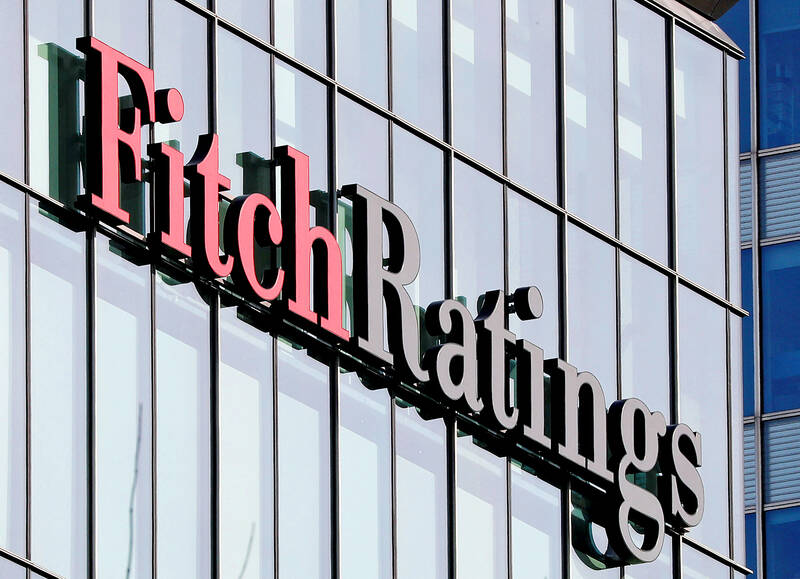Taiwan’s plan to implement the final Basel III reforms in January next year would have a very limited impact on local banks’ capitalization and asset growth, since no banks are using the Internal Rating-Based (IRB) approach in calculating credit risk, Fitch Ratings said in a report on Thursday.
The final Basel III reforms include revised credit risk approaches, a standardized operational risk approach, a credit valuation adjustment framework, leverage ratio revisions and an aggregate output floor.
“As such, the output floor under Basel III would have no impact on banks using the standardized approach for calculating credit risk,” the agency said, adding that it does not expect large deviations in the banks’ capital calculation given that Taiwan’s risk weights are conservative compared with peers.

Photo: Reuters
The new capital rules are to lower the average common equity Tier 1 ratio by less than 20 basis points, it said.
Fitch said it is looking at stable core profitability, solid profit retention and moderate growth in risk-weighted assets to sustain capitalization.
The banks in Taiwan are well-positioned to adopt the new capital rules, including the higher capital surcharge (minimum Tier ratio of 11.0 percent) for domestic systemically important banks (D-SIB) by the end of next year, it said.
Taiwan’s six DSIBs have already met or are on track to meet the minimum regulatory capital ratio.
Banks with assets of more than NT$2.5 trillion (US$78.31 billion) may seek approval to use the more complicated IRB approach, with full implementation likely by 2026, Fitch said.
The IRB approach allows banks to model their own inputs for calculating risk-weighted assets from credit exposures to retail, corporate, financial institutions and sovereign borrowers, subject to supervisory approval.
IRB adoptions would be limited initially to DSIBs and that their operating profit/risk-weighted assets and Tier 1 ratios would improve modestly as they leverage on the capital uplift to expand their lending capacity, Fitch said.
However, their financial metrics would remain below those of regional peers in developed markets, in light of persistent competition and thin margins in Taiwan’s highly fragmented banking sector, it said.
Taiwan’s bank capital regime would remain more conservative relative to global practices, although risk-weight calculations post-IRB adoption should narrow relative to regional peers, it added.
Taiwan excludes property revaluation and other comprehensive income valuation gains from Tier 1 capital and imposes higher risk weights for select property exposures to contain concentration risk, Fitch said, adding that the sector’s non-performing loan ratio has stayed at very low levels for the past decade.
However, excessive growth in pursuit of yield overseas and high dividend payouts could pressure the banks’ viability ratings, Fitch said.
Still, the country’s stable operating environment would help sustain the banks’ financial metrics regardless of Basel III implementation, it added.

Real estate agent and property developer JSL Construction & Development Co (愛山林) led the average compensation rankings among companies listed on the Taiwan Stock Exchange (TWSE) last year, while contract chipmaker Taiwan Semiconductor Manufacturing Co (TSMC, 台積電) finished 14th. JSL Construction paid its employees total average compensation of NT$4.78 million (US$159,701), down 13.5 percent from a year earlier, but still ahead of the most profitable listed tech giants, including TSMC, TWSE data showed. Last year, the average compensation (which includes salary, overtime, bonuses and allowances) paid by TSMC rose 21.6 percent to reach about NT$3.33 million, lifting its ranking by 10 notches

Popular vape brands such as Geek Bar might get more expensive in the US — if you can find them at all. Shipments of vapes from China to the US ground to a near halt last month from a year ago, official data showed, hit by US President Donald Trump’s tariffs and a crackdown on unauthorized e-cigarettes in the world’s biggest market for smoking alternatives. That includes Geek Bar, a brand of flavored vapes that is not authorized to sell in the US, but which had been widely available due to porous import controls. One retailer, who asked not to be named, because

SEASONAL WEAKNESS: The combined revenue of the top 10 foundries fell 5.4%, but rush orders and China’s subsidies partially offset slowing demand Taiwan Semiconductor Manufacturing Co (TSMC, 台積電) further solidified its dominance in the global wafer foundry business in the first quarter of this year, remaining far ahead of its closest rival, Samsung Electronics Co, TrendForce Corp (集邦科技) said yesterday. TSMC posted US$25.52 billion in sales in the January-to-March period, down 5 percent from the previous quarter, but its market share rose from 67.1 percent the previous quarter to 67.6 percent, TrendForce said in a report. While smartphone-related wafer shipments declined in the first quarter due to seasonal factors, solid demand for artificial intelligence (AI) and high-performance computing (HPC) devices and urgent TV-related orders

MINERAL DIPLOMACY: The Chinese commerce ministry said it approved applications for the export of rare earths in a move that could help ease US-China trade tensions Chinese Vice Premier He Lifeng (何立峰) is today to meet a US delegation for talks in the UK, Beijing announced on Saturday amid a fragile truce in the trade dispute between the two powers. He is to visit the UK from yesterday to Friday at the invitation of the British government, the Chinese Ministry of Foreign Affairs said in a statement. He and US representatives are to cochair the first meeting of the US-China economic and trade consultation mechanism, it said. US President Donald Trump on Friday announced that a new round of trade talks with China would start in London beginning today,